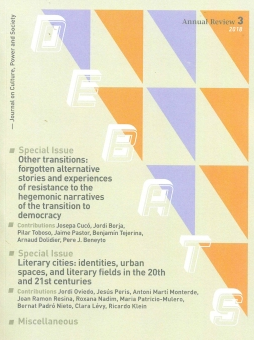Disquiet Lisbon: literary representation as an experience of an invisible city in Livro do Desassossego
Resum
Fernando Pessoa’s literary work can be read as a fantastic response to the situation of experiential impoverishment (Benjamin) and indolence of the soul (Simmel) that urban environments subject individuals to. Livro do Desassossego offers an incomparable description of the possibilities and conditions of an urban representation that omits the monumental dimension of the city to give meaning to the banal situations, mediocracy of life, and routines of the social mechanisms that bring this space to life. Soares develops an aesthetic theory based on indifference, which he calls “erudition of sensitivity” and the imaginative work operating in the “inner modality of the outside”. An aesthetic theory that causes rifts to open in art in the least favourable places. Faced with the processes of disintegration suffered by the protagonist and the impossibility of completely experiencing the city, writing becomes the space of mediation that gives meaning to a wrecked individual and a blurred city, insofar as they communicate with each other. This allows a personal Lisbon to emerge, one which is allegorised and turned into literatureDescàrregues
Descàrregues
Publicades
Com citar
Número
Secció
Llicència
Sense perjudici del que disposa l'article 52 de la Llei 22/1987 d'11 de novembre de Propietat Intel·lectual, BOE del 17 de novembre de 1987, i conforme a aquest, els/les autors o autores cedeix/en a títol gratuït els seus drets d'edició, publicació, distribució i venda sobre l'article, per tal que siga publicat a Debats. Revista sobre cultura, poder i societat.
Debats. Revista de cultura, poder i societat es publica sota el sistema de llicències Creative Commons segons la modalitat “Reconeixement – NoComercial (by-nc): Es permet la generació d’obres derivades sempre que no se’n faça un ús comercial. Tampoc no es pot fer servir l’obra original amb finalitats comercials”.
Així, quan l’autor/a envia la seva col·laboració, accepta explícitament aquesta cessió de drets d’edició i de publicació. Igualment autoritza Debats. Revista de cultura, poder i societat la inclusió del seu treball en un fascicle de la revista perquè es puga distribuir i vendre.











